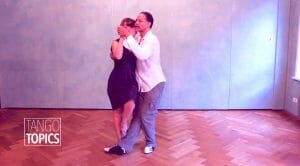The Musical Tools of Tango
These videos teach a skill that emphasizes the 5 Pauses of Tango Music. Each video shows you a working exercise to teach you how to do this with every piece of music.
There are a host of skills being developed here which are in no particular order: a.) Understanding the orchestral lead, which helps to inform your dancing choices. b.) Understanding musical time and how to reinforce it. c.) How to fix your “Can’t find a beat to save your life!” issues that you didn’t know you had. d.) What markers to listen for in each piece of music regardless of genre. And that’s just the tip of the iceberg. There’s more, lots more. These 3 videos (5), give you the basic building blocks you’ll need to start to listen to the music in a very different way.
Building Your Music Skills

Musical Interpretation – Parts 1 & 2
What is ‘Musical Interpretation’ ? Musical Interpretation is a term that means brings together to very different ideas. First, ’Musical’, is that either role hears the music in a very specific way so that they can thereby convey the meaning of a piece of music via movements that represent that

Musical Interpretation – Parts 3 & 4
Today’s Tango Topic refines the process of Musical Interpretation, by showing you how to use Musical Interpretation with two important tools: Alternation & Symmetry. The end goal here is to

Musical Interpretation with Traveling Ochos! 🙂
Musical Interpretation. Another aspect of Musical Interpretation is what happens when you start to apply very specific pieces of Tango Vocabulary to fit with the music. It is through this specificity of the <a class="glossaryLink cmtt_Definition" aria-describedby="tt" data-cmtooltip="cmtt_24d6924183285158fd61f4f15f05d944" href="https://staging.tangotopics.com/topics-dictionary/vocabulary/" data-mobile-support="0"

Musical Interpretation with Turns
What is a Musical Turn ? First and foremost it is a ‘Turn’ or rotation that the couple initiates within the line and lane of dance that can exist in one of three places in the music. 1.) The space between the musical pauses (which is what typically occurs). 2.)

Musical Interpretation with the Argentine Cross 🙂
Section 5b of Musical Interpretation, we continue with specific granular control (from a leading and following perspective), with a piece of well known and well-worn piece of Tango vocabulary occurring

Teaching Musical Interpretation
1.) Learning the Pauses. First let’s dispense with the fact that you ‘Yes you must know where the beat is at’! That’s a given. Tango Topics does an adequate job of giving you the tools to hear the beat, not to mention describes what the on or down beat is,

The Accent Note
The Accent Note is rife in Tango, Milonga, and Vals. It’s everywhere and also in the most unexpected places! They are there for one reason: To draw attention to that particular measure of music that you’re listening to, highlighting that measure as if it were bolded, italicized, or underlined text.

La Variación (The Variation of Tango Music)
What is "La Variación", it’s exactly what it sounds like. It’s a variation of the musical theme of the piece of music that you’re listening to. Each piece of Tango Music has a major theme, and that theme can be ‘varied’, hence the term. La Variacion happens in a very
